大学英语泛读教程3(第三版)课件Unit 6
- 格式:pptx
- 大小:5.56 MB
- 文档页数:32
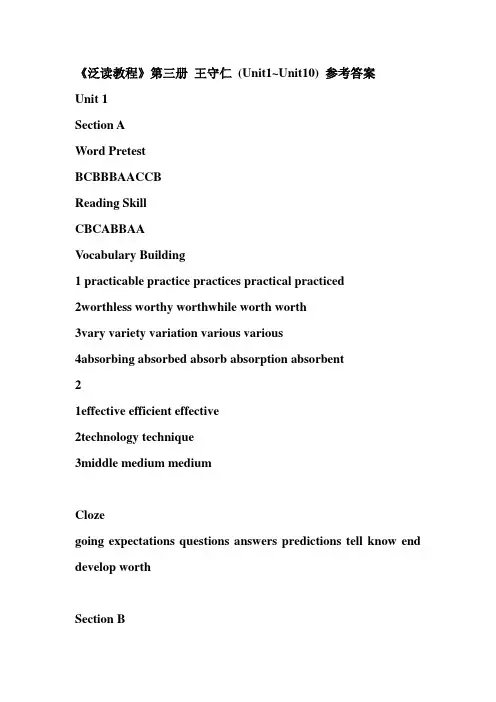
《泛读教程》第三册王守仁(Unit1~Unit10) 参考答案Unit 1Section AWord PretestBCBBBAACCBReading SkillCBCABBAAVocabulary Building1 practicable practice practices practical practiced2worthless worthy worthwhile worth worth3vary variety variation various various4absorbing absorbed absorb absorption absorbent21effective efficient effective2technology technique3middle medium mediumClozegoing expectations questions answers predictions tell know end develop worthSection BTFTT CBCC TFF CAACCASection CFFTFFTTTUnit 2Section AWord PretestABACCABABCCReading SkillCBB FTFFTTVocabulary Building11mess 2preference 3aimlessly 4remarkable 5decisive 6shipment 7fiery 8physically 9action 10housing21aptitude attitude2account counted counted3talent intelligenceClozeother just has some than refuse see that without if ready wrongSection BACCCCCCCACBABASection CCCDDACUnit 3Section AWord PretestABCCBDCDCReading SkillBABCAACBCVocabulary Building1Admission admit admissible admissiblyReliance rely reliable reliablyDefinition define definite definitelyAssumption assume assumed assumedlyBehavior behave behavioral behaviorallyVariety vary various variouslyPart part partial partiallyManager manage managerial manageriallyCorrelation correlate correlative correlativelyAdaptation adapt adaptive adaptively21inspired aspired inspired2token badges token3contemporaries temporary contemporaryClozeCommunicate ways using in of message meet causes meaning to eyesSection BBABBAC FFTTTF CCBSection CBBDDBCCA FFTFFTUnit 4Section AWord PretestCACAABBBCCReading SkillBBACBCCAAVocabulary Building11moist 2betrayal 3exclusively 4inhumane 5amazed 6endangered 7marvels 8deadly21dessert deserted2favourite favorable favorable3awarded reward awardedClozeParents idea at seen landmarks instance migrate guide pole effect it if experimentsSection BCCB FTF BCACCBACCSection CFFTFFFTTFTUnit 5Section AWord PretestCAABCACCCReading SkillCABCB FFTFTTVocabulary Building1Assumption assume assumed assumedly Acknowledgement acknowledge acknowledgedly Reflection reflect reflective reflectively Domination dominate dominant dominantly Category categorize categorical categoricallyImplication imply implicative implicativelyReassurance reassure reassuring reassuringlyDefinition define definite definitely21historical historic2rejected resist3test analyzedClozeExisted over head body found language use single passed ahead survival handlingSection BCABCBB TTTFTT CACSection CBBAAACBCUnit 6Section AWord PretestC ACBABACABABReading SkillCAACACCAVocabulary BuildingAvailability avail available availablyConquest conquer conquering conqueringlyLuxury luxuriate luxurious luxuriouslyOrgin orginate original originallyOccurrence occur occurrentSystem systematize systematical systematicallyPhonology (这个是没有动词形式的)phonological phonologicallyDecision decide decided decidedlyVariety vary various variouslySuperiority (这个是没有动词形式的)superior superiorlyPeculiar particular particularAssess access accessResources source sourcesClozeSex men differs compliment complimenting causes makes languages have outside understood have use circleSection BCBBBACBCCCCBACCBASection CBBCABBACCBUnit 7Section AWord PretestABABCBACReading SkillBBBCCBCBVocabulary BuildingDeduced behavior adhere replacement option delicacy enormous pursuitInquired required inquire requiredCompatible comparable compatible comparableClozeSatellite some space asked life sort orbiting have living were believe own solar where likely living throughSection BFTFFTTTTTFFFBBCACCSection CBCBCCAEDEBAFDCUnit 8Section AWord PretestBCABCBBCCAReading SkillCBABCBCCCCVocabulary BuildingOccupation occupy occupational occupationallySegregation segregate segregated(这个没有副词)Discrimination discriminate discriminating discriminatingly Enforcement enforce enforceable enforceablyExclusion exclude exclusive exclusivelyPerseverance persevere persevering perseveringlyConviction convict convictive convectivelyAmendment amend amendable(这个没有副词)Superficiality superficialize superficial superficially Spectator spectate spectatorial (这个没有副词)Job career jobs careerPrincipal principles principal principleFeminine female feminineClozeAcceptable domestic property wages husband divorce claims legal suit permitted make excluded lacked belonged determined Section BBACCCCACCCAABBACTTFSection CCCAACBUnit 9Section AWord PretestBAABCACBBABCReading SkillCACCBBBBBACBVocabulary BuildingTypifies dominant familial competitive vibrate descended departure boom countless symbolizesRecreation recreates recreationRhythm rhyme rhymes rhythmClozeSea within of divides built celebrated inside attract together whenSection BFTFTTCCBBCBAACCACSection CBAACABCCCCUnit 10Section AWord PretestCABCBBBBABReading SkillCBCACCCABBVocabulary BuildingConsequence(这个没有动词形式)consequent consequently Sophistication sophisticate sophisticated sophisticatedly Reference refer referable referablyConversation converse conversational conversationally Space space spatial spatiallyDetachment detach detachable detachablyIntervention intervene intervening(这个没有副词)Type typify typical typicallyAssure ensure assured ensureArises raised rise raised arisenClue cues clue cueClozeWell separating is own close need look order respect follow prior sign help was elseSection BBBCTTFBCACACTFFSection CTFFTFFFF。
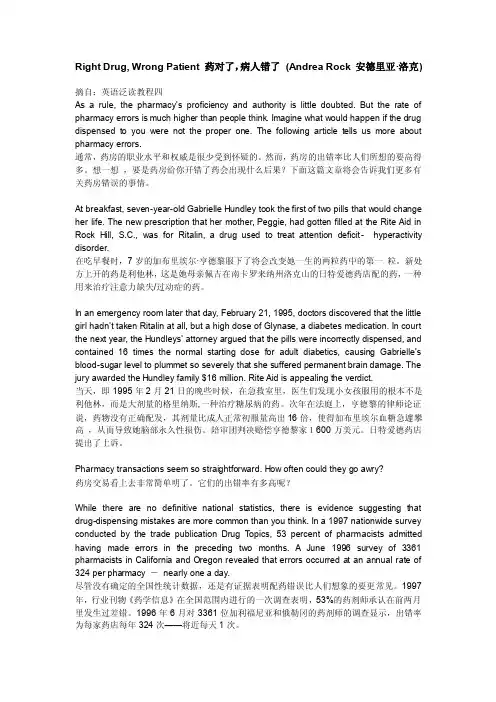
Right Drug, Wrong Patient 药对了,病人错了(Andrea Rock 安德里亚·洛克)摘自:英语泛读教程四As a rule, the pharmacy's proficiency and authority is little doubted. But the rate of pharmacy errors is much higher than people think. Imagine what would happen if the drug dispensed to you were not the proper one. The following article tells us more about pharmacy errors.通常,药房的职业水平和权威是很少受到怀疑的。
然而,药房的出错率比人们所想的要高得多。
想一想,要是药房给你开错了药会出现什么后果?下面这篇文章将会告诉我们更多有关药房错误的事情。
At breakfast, seven-year-old Gabrielle Hundley took the first of two pills that would change her life. The new prescription that her mother, Peggie, had gotten filled at the Rite Aid in Rock Hill, S.C., was for Ritalin, a drug used to treat attention deficit- hyperactivity disorder.在吃早餐时,7岁的加布里埃尔·亨德黎服下了将会改变她一生的两粒药中的第一粒。
新处方上开的药是利他林,这是她母亲佩吉在南卡罗来纳州洛克山的日特爱德药店配的药,一种用来治疗注意力缺失/过动症的药。
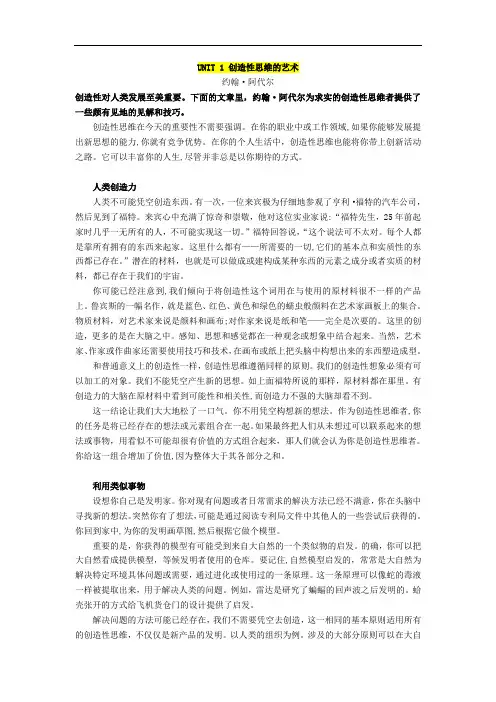
UNIT 1 创造性思维的艺术约翰·阿代尔创造性对人类发展至美重要。
下面的文章里,约翰·阿代尔为求实的创造性思维者提供了一些颇有见地的见解和技巧。
创造性思维在今天的重要性不需要强调。
在你的职业中或工作领域,如果你能够发展提出新思想的能力,你就有竞争优势。
在你的个人生活中,创造性思维也能将你带上创新活动之路。
它可以丰富你的人生,尽管并非总是以你期待的方式。
人类创造力人类不可能凭空创造东西。
有一次,一位来宾极为仔细地参观了亨利·福特的汽车公司,然后见到了福特。
来宾心中充满了惊奇和崇敬,他对这位实业家说:“福特先生,25年前起家时几乎一无所有的人,不可能实现这一切。
”福特回答说,“这个说法可不太对。
每个人都是靠所有拥有的东西来起家。
这里什么都有——所需要的一切,它们的基本点和实质性的东西都已存在。
”潜在的材料,也就是可以做成或建构成某种东西的元素之成分或者实质的材料,都已存在于我们的宇宙。
你可能已经注意到,我们倾向于将创造性这个词用在与使用的原材料很不一样的产品上。
鲁宾斯的一幅名作,就是蓝色、红色、黄色和绿色的蠕虫般颜料在艺术家画板上的集合。
物质材料,对艺术家来说是颜料和画布;对作家来说是纸和笔——完全是次要的。
这里的创造,更多的是在大脑之中。
感知、思想和感觉都在一种观念或想象中结合起来。
当然,艺术家、作家或作曲家还需要使用技巧和技术,在画布或纸上把头脑中构想出来的东西塑造成型。
和普通意义上的创造性一样,创造性思维遵循同样的原则。
我们的创造性想象必须有可以加工的对象。
我们不能凭空产生新的思想。
如上面福特所说的那样,原材料都在那里。
有创造力的大脑在原材料中看到可能性和相关性,而创造力不强的大脑却看不到。
这一结论让我们大大地松了一口气。
你不用凭空构想新的想法。
作为创造性思维者,你的任务是将已经存在的想法或元素组合在一起。
如果最终把人们从未想过可以联系起来的想法或事物,用看似不可能却很有价值的方式组合起来,那人们就会认为你是创造性思维者。
![大学体验英语综合教程3[第三版]Unit6PPT课件](https://uimg.taocdn.com/f118513a783e0912a2162a95.webp)
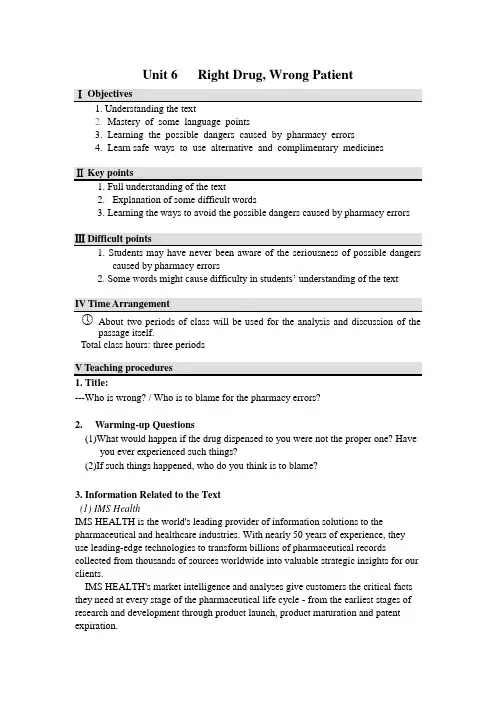
Unit 6 Right Drug, Wrong Patient2. Mastery of some language points3. Learning the possible dangers caused by pharmacy errors4. Learn safe ways to use alternative and complimentary medicines2.Explanation of some difficult words3. Learning the ways to avoid the possible dangers caused by pharmacy errorscaused by pharmacy errors2.Some words might cause difficulty in students’ understanding of the textAbout two periods of class will be used for the analysis and discussion of the passage itself.Total class hours: three periods1. Title:---Who is wrong? / Who is to blame for the pharmacy errors?2. Warming-up Questions(1)What would happen if the drug dispensed to you were not the proper one? Haveyou ever experienced such things?(2)If such things happened, who do you think is to blame?3. Information Related to the Text(1) IMS HealthIMS HEALTH is the world's leading provider of information solutions to the pharmaceutical and healthcare industries. With nearly 50 years of experience, they use leading-edge technologies to transform billions of pharmaceutical records collected from thousands of sources worldwide into valuable strategic insights for our clients.IMS HEALTH's market intelligence and analyses give customers the critical facts they need at every stage of the pharmaceutical life cycle - from the earliest stages of research and development through product launch, product maturation and patent expiration.With more than 5,000 professionals in 100 countries - from Austria to Australia - from China to Costa Rica - from Saudi Arabia to Senegal - IMS HEALTH is a trusted healthcare-industry strategic partner, with thousands of customers and annual revenue in 2001 of $1.3 billion.(2) U. S. PharmacopeiaIn pursuit of its mission to promote public health, USP establishes state-of-the-art standards to ensure the quality of medicines for human and veterinary use. USP also develops authoritative information about the appropriate use of medicines. National health care practitioner reporting programs support USP's standards and information programs. In addition, USP supports many public service programs.(3) Careers in medicine in the USTo become a medical doctor in the US, one must attend four years of college and receive a bachelor’s degree, followed by four years of medical school. Then he becomes an intern in a hospital and receives supervised practical training. As an intern, he has to “make rounds” with other doctors, visiting hospital patients. He is supposed to help give special treatments and answer emergency calls in the hopital at any time of day or night. Finally he becomes a resident at a hospital. Like the intern, he learns by observing the work of others. But the resident has much more responsibility than the intern. He often assists experienced surgeons during operations. In an emergency, he may take over the work of the staff surgeon.Internship and residency combined take three to five years, depending on one’s area of specialization. Hospitals have several interns and many residents on their staff. A resident who is completing his residency period and who thereby distinguished himself is selected to be chief resident, a position of greater responsibility.(4) Three types of doctors1. General practitioners 全科医生2. Specialists3. Researchers4. Text analysis(1)Article Abstract:Drug-dispensing errors are a common occurrence, requiring customers to be vigilant when having their prescriptions filled at pharmacies. These errors are attributed to understaffing and the consequent increase in workloads in the retail drug industry, coupled with rising prescription volume. Tips on how one's family can be protected from pharmacy errors are presented.(4)passage divisionPart I (para.1-8) By giving examples and providing statistics, the author pointout the seriousness of the drug dispensing errors.Part I (para.9-31) Some ways on how to protect you family and yourself.5. Key words and phrases(1) pharmacy error/drug dispensing error(2) prescription(3) dose(4) awry(5) churn out(6) be attributed to(7) fatal (8)medical vendor(9) submit to(10) oversight(11) counsel(12) pharmacist(13) adverse effect(14) dearth6. Language Notes1. The new prescription that her mother, Peggie, had gotten filled at the Rite Aid in Rock Hill, S.C., was for Ritalin, a drug used to treat attention deficit-hyperactivity disorder.(新处方上开的药是"利他林",这是她母亲佩吉在南卡罗来纳州洛克山的"莱特相助"药店配的药,一种用来治疗注意力亢奋/不足的药。
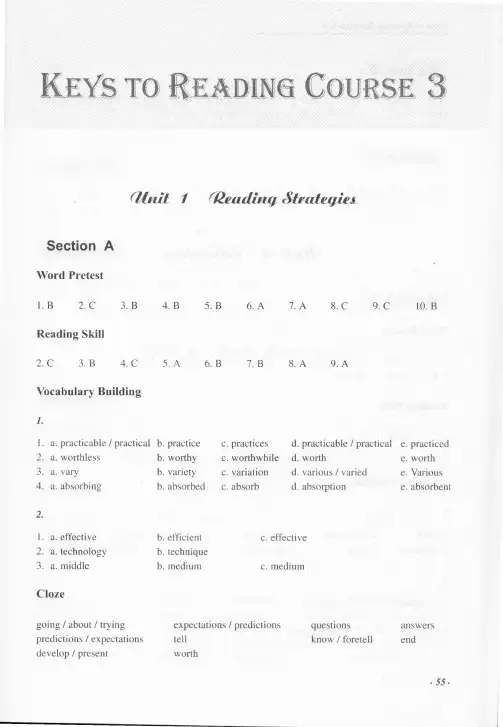
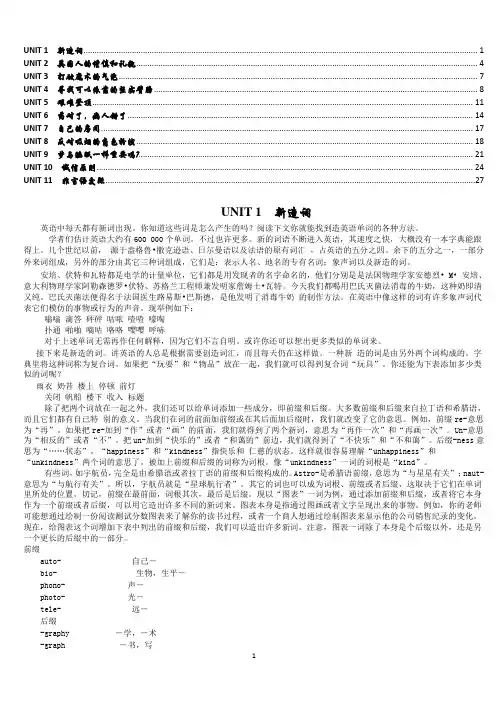
UNIT 1 新造词 (1)UNIT 2 英国人的谨慎和礼貌 (4)UNIT 3 打破魔术的气泡 (7)UNIT 4 寻找可以依靠的坚实臂膀 (8)UNIT 5 艰难登顶 (11)UNIT 6 药对了,病人错了 (14)UNIT 7自己的房间 (17)UNIT 8 反对吸烟的角色扮演 (18)UNIT 9 梦与睡眠一样重要吗? (21)UNIT 10 诚信原则 (24)UNIT 11 非言语交际 (27)UNIT 1新造词英语中每天都有新词出现。
你知道这些词是怎么产生的吗?阅读下文你就能找到造英语单词的各种方法。
学者们估计英语大约有600 000个单词,不过也许更多。
新的词语不断进入英语,其速度之快,大概没有一本字典能跟得上。
几个世纪以前,源于盎格鲁•撒克逊语、日尔曼语以及法语的原有词汇,占英语的五分之四。
余下的五分之一,一部分外来词组成,另外的部分由其它三种词组成,它们是:表示人名、地名的专有名词;象声词以及新造的词。
安培、伏特和瓦特都是电学的计量单位,它们都是用发现者的名字命名的,他们分别是是法国物理学家安德烈• M•安培、意大利物理学家阿勒森德罗•伏特、苏格兰工程师兼发明家詹姆士•瓦特。
今天我们都喝用巴氏灭菌法消毒的牛奶,这种奶即清又纯。
巴氏灭菌法便得名于法国医生路易斯•巴斯德,是他发明了消毒牛奶的制作方法。
在英语中像这样的词有许多象声词代表它们模仿的事物或行为的声音。
现举例如下:嗡嗡滴答砰砰咕哝喳喳嚎啕扑通啪啪嘀咕咯咯嘤嘤呼哧对于上述单词无需再作任何解释,因为它们不言自明。
或许你还可以想出更多类似的单词来。
接下来是新造的词。
讲英语的人总是根据需要创造词汇,而且每天仍在这样做。
一种新造的词是由另外两个词构成的。
字典里将这种词称为复合词。
如果把“玩耍”和“物品”放在一起,我们就可以得到复合词“玩具”。
你还能为下表添加多少类似的词呢?雨衣奶昔楼上停顿前灯关闭帆船楼下收入标题除了把两个词放在一起之外,我们还可以给单词添加一些成分,即前缀和后缀。
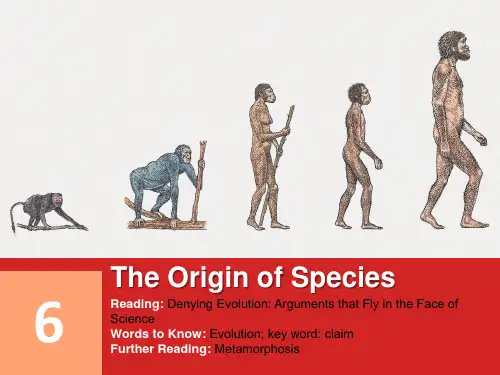
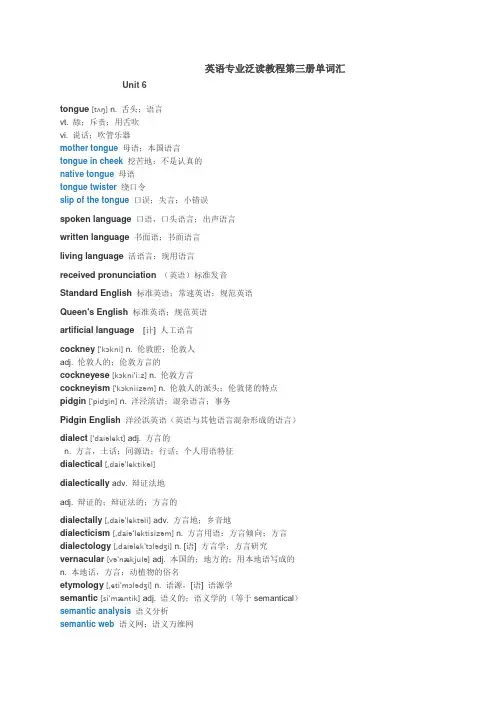
英语专业泛读教程第三册单词汇Unit 6tongue [tʌŋ]n. 舌头;语言vt. 舔;斥责;用舌吹vi. 说话;吹管乐器mother tongue母语;本国语言tongue in cheek挖苦地;不是认真的native tongue母语tongue twister绕口令slip of the tongue口误;失言;小错误spoken language 口语,口头语言;出声语言written language 书面语;书面语言living language 活语言;现用语言received pronunciation (英语)标准发音Standard English 标准英语;常速英语;规范英语Queen's English 标准英语;规范英语artificial language [计] 人工语言cockney ['kɔkni]n. 伦敦腔;伦敦人adj. 伦敦人的;伦敦方言的cockneyese [kɔkni'i:z]n. 伦敦方言cockneyism ['kɔkniizəm]n. 伦敦人的派头;伦敦佬的特点pidgin ['pidʒin]n. 洋泾滨语;混杂语言;事务Pidgin English 洋泾浜英语(英语与其他语言混杂形成的语言)dialect ['daiəlekt] adj. 方言的n. 方言,土话;同源语;行话;个人用语特征dialectical [,daiə'lektikəl]dialectically adv. 辩证法地adj. 辩证的;辩证法的;方言的dialectally [,daiə'lektəli]adv. 方言地;乡音地dialecticism [,daiə'lektisizəm]n. 方言用语;方言倾向;方言dialectology [,daiəlek'tɔlədʒi]n. [语] 方言学;方言研究vernacular [və'nækjulə]adj. 本国的;地方的;用本地语写成的n. 本地话,方言;动植物的俗名etymology [,eti'mɔlədʒi]n. 语源,[语] 语源学semantic [si'mæntik]adj. 语义的;语义学的(等于semantical)semantic analysis语义分析semantic web语义网;语义万维网semantic meaning [语]语义semantic structure语义结构semantic feature语义特征;语意特征;语义要素semantical [si'mæntikl]adj. 语义的semantically [si'mæntikəli]adv. 语义地semantics [si'mæntiks]n. [语] 语义学;语义论linguistics [liŋ'ɡwistiks]n. 语言学cognitive linguistics认知语言学applied linguistics应用语言学;运用语言学corpus linguistics语料库语言学computational linguistics计算语言学social linguistics社会语言学linguistic [liŋ'ɡwistik,-kəl]adj. 语言的;语言学的linguistic competence语言能力linguistic context语言语境;语言的前后关系linguistic form语言形态linguistic analysis语言分析linguistic expression语言表达式linguistically [liŋ'gwistikəli]adv. 语言的;语言学方面linguistical [liŋ'ɡwistik,-kəl]adj. 语言学的;语言学上的linguistry ['liŋɡwistri]n. 语言学知识,语言知识bilingual [bai'liŋɡwəl]adj. 双语的n. 通两种语言的人bilingual teaching双语教学bilingual education n. 双语教育bilingual dictionary双语词典;双语对照词典bilingual edition双语版bilinguality [,bailiŋ'ɡwæləti]adj. 能说两种语言的bilingualism [bai'liŋɡwəlizəm]n. 能用两种语言Anglicism ['æŋɡlisizəm]n. 英式英语;英国风格;英国式特征;典型的英国说法;对英国方式的崇尚Americanism [ə'merikənizəm]n. 美国精神;美国风格;美国腔Americanise [ə'merikənaiz]vi. 美国化n. 美国化n. 美国精神;美国风格;美国腔Americanize [ə'merikənaiz]vt. 使美国化vi. 美国化Americanist [ə'merikənist]n. 研美学者Americanisation [ə'merikəni'zeiʃən]n. 美国化Americanization [ə,merikənai'zeiʃən; -ni'z-]n. 美国化Americanized adj. 美国化的v. 美国化(Americanize的过去分词)slang [slæŋ]n. 俚语;行话adj. 俚语的vi. 用粗话骂vt. 用俚语说vulgarism ['vʌlɡərizəm]n. 粗俗语;粗鄙;下流话vulgaris ['vʌlgəris]adj. 寻常的vulgarize ['vʌlɡəraiz]vt. 使通俗化;使庸俗化vulgarization [,vʌlɡərai'zeiʃən, -ri'z-]n. 通俗化;粗俗化vulgarity [vʌl'ɡærəti]n. 粗俗;粗俗语;粗野的动作vulgarian [vʌl'ɡεəriən]n. 俗人;俗物;庸俗的暴发户jargon ['dʒɑ:ɡən, -ɡɔn]n. 行话,术语;黄锆石jargonize ['dʒɑ:ɡənaiz]vt. 使成行话或术语vi. 讲难懂的话jargonise ['dʒɑ:ɡənaiz]vt. 用术语讲vi. 用术语讲byword ['baiwə:d]n. 谚语,俗语;格言;笑柄euphemism ['ju:fimizəm]n. 委婉语;委婉说法euphemisms n. 委婉语;委婉用法;委婉的说法colloquialism [kə'ləukwiəlizəm]n. 白话,口语;口语体;方言用语language acquisition language acquisition 【语言学】语言获得;语言习惯语言习得acquisition [,ækwi'ziʃən]n. 获得物,获得data acquisition数据采集data acquisition system数据采集系统;资料获取系统land acquisition土地征用merger and acquisition收购兼并;兼并与收购lexicographic [,leksikə'græfik]adj. 词典编辑的;字典式的lexicographer [,leksi'kɔɡrəfə]n. 词典编纂者lexicographist [,leksi'kɔɡrəfist]n. 辞典编纂者(等于lexicographer)lexicographical [,leksikəu'ɡræfikəl]adj. 辞典编纂的lexicography [,leksi'kɔɡrəfi]n. 词典编纂OED (Ordnace Engineering Division)abbr. 军械工程处division [di'viʒən]n. 除法;部门;分割;师(军队);[体]赛区division of labor劳动力的分工frequency division分频;频率划分administrative division行政区域。
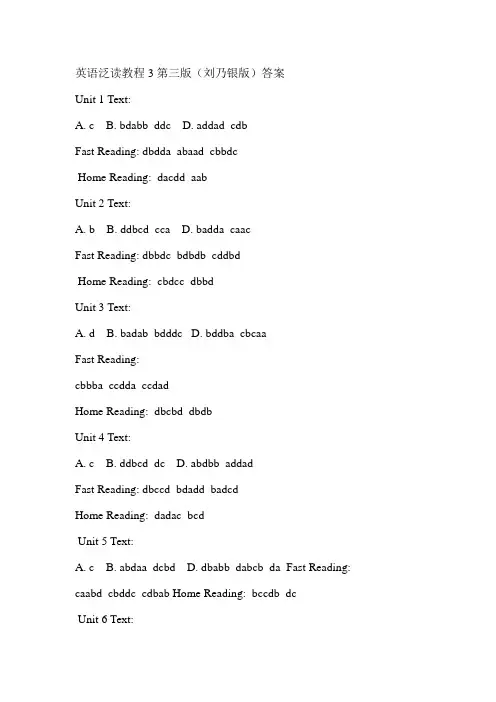
英语泛读教程3第三版(刘乃银版)答案Unit 1 Text:A. cB. bdabb ddc D. addad cdbFast Reading: dbdda abaad cbbdcHome Reading: dacdd aabUnit 2 Text:A. bB. ddbcd cca D. badda caacFast Reading: dbbdc bdbdb cddbdHome Reading: cbdcc dbbdUnit 3 Text:A. dB. badab bdddc D. bddba cbcaaFast Reading:cbbba ccdda ccdadHome Reading: dbcbd dbdbUnit 4 Text:A. cB. ddbcd dc D. abdbb addadFast Reading: dbccd bdadd badcdHome Reading: dadac bcdUnit 5 Text:A. cB. abdaa dcbd D. dbabb dabcb da Fast Reading: caabd cbddc cdbab Home Reading: bccdb dcUnit 6 Text:A. bB. cbcab ddad D. badaa cbaacFast Reading: cabcd aadcb ccdabHome Reading: ccdcd abcUnit 7Text:A. dB. acbda dcaac D. abaac daccd adFast Reading:daada cddbc bdcdb Home Reading: cbadb cddbcUnit 8 Text:A. cB. cddcc dccb D. abdac aaaFast Reading:ccacd bbdad babddHome Reading: dbdbc cbcdUnit 9 Text:A. cB. bccbc dbba D. dcbab dacba c Fast Reading:dcbca bccbc bcddd Home Reading: dcdca bdUnit 10 Text:A. cB. cdccd bacac D. dcdbc acadc bd Fast Reading:dbdcc dccdb bddca Home Reading: cadcb acbbUnit 11 Text:A. dB. adacc dcb D. abacb dcaab adc Fast Reading: dcdab ccbda ccbca Home Reading: bcadb bcdddUnit 12 Text:A. bB. bbbdd ccc D. cdccd acdba dca Fast Reading:bbddc dbdbc cdcdd Home Reading: bcdcc badbb c Unit13 Text:A. cB. cdcad bab D. cbada cabdbFast Reading:cdacc caccd bdbdb Home Reading: bdbcc bdd Unit 14 Text:A. cB. ddcad dab D. dacad babad bFast Reading:ddabb bddca dcccb Home Reading: cdcda ddUnit 15 Text:A. cB. abbac bccdb b D. babcc aaacd bb Fast Reading: caccb accd c ddada Home Reading: cdacd ddc。
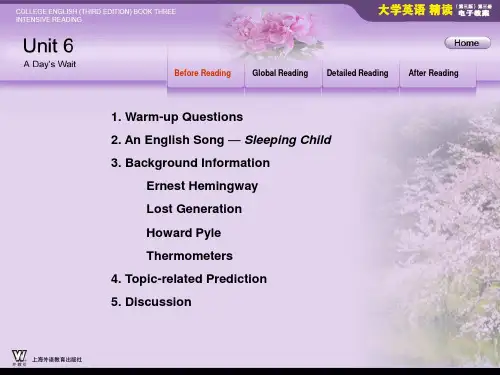
英语泛读教程3第三版答案(免费版)自己整理的哦!Unit 1 Text: A. c B. bdabb ddc D. addad cdb Fast Reading: dbdda abaad cbbdc Home Reading: dacdd aabUnit 2 Text: A. b B. ddbcd cca D. badda caac Fast Reading: dbbdc bdbdb cddbd Home Reading: cbdcc dbbdUnit 3 Text: A. d B. badab bdddc D. bddba cbcaa Fast Reading: cbbba ccdda ccdad Home Reading: dbcbd dbdbUnit 4 Text: A. c B. ddbcd dc D. abdbb addad Fast Reading: dbccd bdadd badcd Home Reading: dadac bcdUnit 5 Text: A. c B. abdaa dcbd D. dbabb dabcb da Fast Reading: caabd cbddc cdbab Home Reading: bccdb dcUnit 6 Text: A. b B. cbcab ddad D. badaa cbaac Fast Reading: cabcd aadcb ccdab Home Reading: ccdcd abcUnit7 Text: A. d B. acbda dcaac D. abaac daccd ad Fast Reading: daada cddbc bdcdb Home Reading: cbadb cddbcUnit 8 Text: A. c B. cddcc dccb D. abdac aaa Fast Reading: ccacd bbdad babdd Home Reading: dbdbc cbcdUnit 9 Text: A. c B. bccbc dbba D. dcbab dacba c Fast Reading: dcbca bccbc bcddd Home Reading: dcdca bdUnit 10 Text: A. c B. cdccd bacac D. dcdbc acadc bd Fast Reading: dbdcc dccdb bddca Home Reading: cadcb acbbUnit 11 Text: A. d B. adacc dcb D. abacb dcaab adc Fast Reading: dcdab ccbda ccbca Home Reading: bcadb bcdddUnit 12 Text: A. b B. bbbdd ccc D. cdccd acdba dca Fast Reading: bbddc dbdbc cdcdd Home Reading: bcdcc badbb cUnit 13 Text: A. c B. cdcad bab D. cbada cabdb Fast Reading: cdacc caccd bdbdb Home Reading: bdbcc bddUnit 14 Text: A. c B. ddcad dab D. dacad babad b Fast Reading: ddabb bddca dcccb Home Reading: cdcda ddUnit 15 Text: A. c B. abbac bccdb b D. babcc aaacd bb Fast Reading: caccb accdc ddada Home Reading: cdacd ddc。
Extensive reading 3unit 2Para4: Sympathy or admiration for artistic skill are felt to be stronger than laughter.Para5: Like a sense of humor, sportsmanship is an English ideal which not all Englishmen live up to.English school boys often show this sense of sportsmanship to a surprisingly high degree in their relations with each other.同情心或对艺术技巧的崇敬比嘲笑的份量重的多。
如幽默感一样,运动员精神是英国式的理想,这一点并不是所有的英国人都做得到。
英国小学生在互相交往中往往把这种运动精神演绎的淋漓尽致。
Para 6: when the request is granted, and at any time when you are receiving something, however obviously you are entitled to it, you are always expected to s ay ”Thank you”.Para 7: British people do not readily ask each other to do anything that would involve real inconvenience.Para 10: more…than…Thus, “we need some young blood” i s often heard in organizations where the energy and modern methods of younger men are felt to be more likely to succeed than the long but partly irrelevant experience of older ones.当你的要求被满足或者收到任何礼物,不管你怎样当之无愧,你也应该说谢谢。
Unit 6Text IVocabulary ChangePre-reading questions1.Give the meaning of the underlined words doublet and veal?2.Give the main idea of paragraph 2, 4, 6, 9 and 10(9+10=the last two)3.What are the causes for borrowing words according to the text?4.How do people adapt to new borrowed words?5.What changes are made of the meaning of borrowed words according to the text?BorrowingBorrowing is a way of adding new vocabulary items to a language. Speakers of a language often have contact with speakers of other language. If a speaker of one of these languages does not have a readily available word for something in the world and a speaker of the other language does, the first speaker often borrows the word from the second speaker. The first settlers in North America had contact with the Indians who had already developed names for places and things peculiar to the North American continent.Consequently, the settlers borrowed such words as Massachusetts, Wisconsin, Michigan, Illinois, Chicago, and Mississippi, to mention a few place-names only.Another large group of words came into English as a result of contact through invasion,in this case the Norman Conquest of England in 1066. Various kinds of words were borrowed into English: for matters of government like crown, country, duke, court, and prince; for matters of law like judge, jury, crime, accuse, marry, and prove; for matters of war like battle, arms, soldier, siege, danger, and march; and for matters of religion like angel, saint, pray, save, blame, virtue, and vice. Then, too, today we find interesting pairs of words such as cow and beef, sheep and mutton, calf and veal, and pig and pork in which the first item, the name of the animal, is Germanic in origin and the second item, the meat of the animal, is a borrowing from French. Perhaps the occurrence of such pairs reflects a society in which the conquered Englishman raised the animals for the table of the conquering Norman.Several points can be made about the Norman Conquest. First, the borrowings from French do not showmuch, if any, cultural superiority in the invaders.Secondly, although the Normans were conquerors, they eventually gave up their French to become speakers of English, just as their ancestors had eventually given up their Germanic language when they invaded France. Thirdly, the borrowings do not show the same intimate relationships between conquered and conqueror as the borrowings that resulted from the earlier Danish invasions of the ninth and tenth centuries, when ''everyday'' words such as egg, sky, gate, skin, skirt, skill, skull, scatter, sister, law, weak, give, take, call, and hit, and particularly the pronouns they, them, and their, and the verb are were borrowed from the Danish invaders.The kinds of contact speakers have with each other may often be judged from the particular items that are borrowed. For example, English has borrowed numerous words from French having to do with clothing, cosmetics, and luxury goods, like ensemble, lingerie, suede, perfume, rouge, champagne, and deluxe. From German have come words associated with food like hamburger and delicatessen. From Italian have come musical words like piano, opera, solo, sonata, soprano, trombone, and serenade. From various Indian languages have come words for once exotic dress items like bandanna, sari, bangle, and pajamas. And from Arabic have come some interesting words beginning with al- (the Arabic determiner): alcohol, alchemy, almanac, and algebra.Of course, Latin and Greek have provided English with the richest resource for borrowing more formal learned rge numbers of words have been borrowed into English from both languages, particularly learned polysyllabic words. Numerous doublets also exist in English, that is, words that have been borrowed twice, once directly from Latin, and the second time through another language, most often French:Latin English French Englishmagister magistrate maitre mastersecurus secure sur sureNorth American English shows a wide contact with other languages in its borrowings: French (levee, prairie); Spanish (mesa, patio); German (fatcakes, smearcase); Dutch (coleslaw, cooky, stoop); American Indian (squash, moccasin, squaw, wigwam); and various African languages (banjo, gumbo, voodoo).At different times speakers of certain languages have shown (show)noticeable resistance to borrowing words, and they have preferred either to exploit native resources or to resort to loan translations instead. Such an English word as superman is a loan translation of the Ubermensch just as marriage of convenience is a loan translation of the French mariage de convenance and it goes without saying of the French ca va sans dire.Borrowings are also assimilated to different degrees. Sometimes a borrowing is pronounced in a decidedly foreign way for a while, but it is usually soon treated according to native sound patterns if it occurs frequently. In English, words such as garage, salon, masseur, ghoul, and hickory, borrowed from a variety of foreignlanguages, are pronounced according to the sound system of English and not according to the phonological rules of the source language.Narrowing and wideningOne process involves narrowing the meaning of a word so that the word achieves a more restricted meaning over the course of time. Meat now means a particular kind of food, not food in general, as it does in the following quotation from the King James version of ''Genesis'': "And God said, Behold, I have given you every herb bearing seed, which is upon the face of the earth,and every tree, in which is the fruit of a tree yielding seed; to you it shall be for meat.”Likewise, deer now refers to a particular kind of animal, not animal in general, as it did in Shakespeare's words "But mice and rats and such small deer have been Tom's food for seven long year." Worm now refers to a particular kind of crawling creature, not any crawling creature, although some of the original more general meaning is contained still in s lowworm, blindworm, and glowworm. Fowl and hound refer to particular kinds of bird and dog and wife, to a particular kind of woman. However, in the case of the last word we can note a more general meaning in midwife, wife of Bath, and perhaps housewife. Finally, North Americans use the word corn in a narrow meaning to refer to maize, whereas the British use it to refer to grain in general. Keats' Ruth standing ''amid the alien corn'' is not standing in a field of maize.The opposite process is widening of meaning. In this process a word achieves a more general meaning. The words bird and dog once referred to specific types of birds and dogs, not to the species in general. The word virtue described a characteristic associated with men, but not with women, just as only women could be said to be hysterical, since men were not possessed of wombs (hystera being the Greek word for ''uterus''. The word sensible once meant ''sensitive'', as it still does in French, and alibi referred to the fact that a person was elsewhere when something happened, not that he had some kind of excuse for something.Notes to Words and background knowledge1.peculiar to: particular to, special to2.Luxury: very comfortable situation surrounded by the best and most expensive things; sth expensive andenjoyable but unnecessary; lavishness, sumptuousness, extravagance; luxurious; (luxuriant)3.Originate: initiate, start, begin4.Exotic: foreign, alien, unusual5.Resort to: adopt, use6.Exploit: develop; make use of, make the most of; take advantage of; abuse, misuse, ill-use7.Assimilate: absorb, take in, help someone feel that they are part of a community and rather than culturefeeling foreign8.Hysterical: n. hysteria; behaving in an uncontrolled way because one is extremely excited, afraid, or upset9.for matters of: things related with; speaking of, with regard to10.vice: sin, crime11.ensemble: set of clothes worn together, as a whole, all together,12.lingerie: night gown; pajama13.suede: leather with a soft brushed surface14.rouge: blusher, make up, lipstick15.deluxe: luxurious16.delicatessen: a store that sells good quality cooked meat, cheese, and food from other countries17.sonata奏鸣曲18.soprano:女高音19.trombone:长号,拉管20.serenade:小夜曲21.bandanna:大头巾22.sari:莎丽23.bangle:bracelet; armlet; wristlet24.alchemy:炼金术,魔法25.almanac:日历,年鉴,历书26.algebra:代数27.polysyllabic:多音节的28.doublet: 同源异形或义的同源词29.levee: dock,30.prairie: plain31.mesa: plateau, highland32.patio: terrace, yard, veranda,天井,院子33.fatcakes34.smearcase: cottage cheese35.coleslaw:凉拌卷心菜36.stoop:游廊37.squash: 西葫芦, 2.〔英国〕果汁汽水38.moccasin: a soft leather shoe with a flat heel, (北美印地安人等穿的)鹿皮靴;硬底软(拖)鞋;(南美)有毒水蛇;噬鱼蛇39.squaw: 北美印地安女人,印第安人的妻子40.wigwam: tall tent used in the past by some native Americans as their home(印第安人的)棚屋41.banjo: 班卓琴42.gumbo:浓汤,秋葵荚43.voodoo:伏都教徒,黑人巫师44.marriage of convenience: a marriage in which the partners have married, not because they love each other,but in order to obtain some benefit, such as the right to live in the other partner’s country.45.Decidedly: definitely, absolutely46.Salon: hair salon; beauty salon; rendezvous, get-together47.masseur :男按摩师48.Ghoul: 1: a legendary evil being that robs graves and feeds on corpses2:one suggestive of a ghoul; especially:one who shows morbid interest in things considered shocking or repulsive —ghoul·ish adjective; —ghoul·ish·ly adverb;—ghoul·ish·ness nounSynonym: ghost, phantom49.Hickory: a North American tree that produces nutsNarrowing and Widening50.Behold: look on51.Likewise: similarly52.Slowworm: 蛇蜥53.Blindworm: 蛇蜥54.Glowworm: 萤火虫55.uterus: womb56.wife of Bath: 见The Wife of Bath's Tale专页57.the Norman Conquest: see also《国概》Norman conquest of EnglandFrom Wikipedia, the free encyclopediaThe Norman conquest of England was the 11th-century invasion and occupation of England by an army of Norman, Breton, and French soldiers led by Duke William II of Normandy, later William the Conqueror.William's claim to the English throne derived from his familial relationship with the (childless)Anglo-Saxon King Edward the Confessor, who may have encouraged William's hopes for the throne. Edward died in January 1066 and was succeeded by his brother-in-law Harold Godwinson. The Norwegian king Harald Hardrada invaded northern England in September 1066, was victorious atthe Battle of Fulford, but Harold defeated and killed him at the Battle of Stamford Bridge on 25 September 1066. Within days, William landed in southern England. Harold marched south to confront him, leaving a significant portion of his army in the north. Harold's army confronted William's invaders on 14 October at the Battle of Hastings; William's force defeated Harold, who was killed in the engagement.Although William's main rivals were gone, he still faced rebellions over the following years and was not secure on his throne until after 1072. The lands of the resisting English elite were confiscated; some of the elite fled into exile. To control his new kingdom, William gave lands to his followers andbuilt castles commanding military strongpoints throughout the land. Other effects of the conquest included the court and government, the introduction of Norman French as the language of the elites, and changes in the composition of the upper classes, as William enfeoffed lands to be held directly from the king. More gradual changes affected the agricultural classes and village life: the main change appears to have been the formal elimination of slavery, which may or may not have been linked to the invasion. There was little alteration in the structure of government, as the new Norman administrators took over many of the forms of Anglo-Saxon government.Elite replacementEnglish emigrationGovernmental systemsLanguageOne of the most obvious effects of the conquest was the introduction of Anglo-Norman, a northern dialect of Old French, as the language of the ruling classes in England, displacing Old English. French words entered the English language, and a further sign of the shift was the usage of names common in France instead of Anglo-Saxon names. Male names such as William, Robert and Richard soon became common; female names changed more slowly. The Norman invasion had little impact on placenames, which had changed significantly after earlier Scandinavian invasions. It is not known precisely how much English the Norman invaders learned, nor how much the knowledge of French spread among the lower classes, but the demands of trade and basic communication probably meant that at least some of the Normans and native English were bilingual.[115] Nevertheless it is knownthat William the Conqueror himself never developed a working knowledge of English and for centuries afterward English was not well understood by the nobility.[116]Immigration and intermarriageSocietyThe Norman conquest of England began on 28 September 1066 with the invasion of England by William, Duke of Normandy. William became known as William the Conqueror after his victory at the Battle of Hastings on 14 October 1066, defeating King Harold II of England. Harold's army had been badly depleted in the English victory at the Battle of Stamford Bridge in Northern England on 25 September 1066 over the army of King Harald III of Norway. By early 1071, William had secured control of most of England, although rebellions and resistance continued until approximately 1088.The Norman conquest was a pivotal event in English history. It largely removed the native ruling class, replacing it with a foreign, French-speaking monarchy, aristocracy, and clerical hierarchy. This, in turn, brought about a transformation of the English language and the culture of England in a new era often referred to as Norman England.By bringing England under the control of rulers originating in France, the Norman conquest linked the country more closely with continental Europe, lessened Scandinavian influence, and also set the stage for a rivalry with France that would continue intermittently for many centuries. It also had important consequences for the rest of the British Isles, paving the way for further Norman conquests in Wales and Ireland, and the extensive penetration of the aristocracy of Scotland byNorman and other French-speaking families, with the accompanying spread of continental institutions and cultural influences.P87 Glossary1.mother tongue:母语2.spoken language:口语3.written language:书面语4.living language:正在使用的语言5.artificial language:计算机/人工语言6.Queen’s English:英语普通话7.Standard English:标准英语8.Received pronunciation:标准发音9.Cockney:伦敦佬10.pidgin English:洋泾浜英语11.dialect:方言12.vernacular:本国语,本地话,土话13.etymology:词源14.semantics:语义学15.linguistics:语言学16.bilingual:双语17.Anglicism:英国风格,英国说法,英国惯用语18.Americanism:美国派,美式,美国习惯19.Slang:俚语20.Vulgarism:粗俗话21.Colloquialism:口头表达22.Euphemism: understatement, 委婉语23.Byword: 俗话,谚语24.Jargon: terminology, slangnguage acquisition: 语言习得26.Lexicographer: a person who does the job of editing a dictionary27.OED: Oxford English dictionaryAfter reading questions1. What is the nationality of the writer? How do you know?2. Does the writer have prejudice against other peoples? Give proof to your answer.3. Explore other forms of word change and give your statement of them. Reference books for word change现代英语词汇学概论/张韵斐主编第3版英语词汇学/汪榕培,王之江主编实用英语词汇学/汪榕培,李冬编著英语词汇学引论/林承璋,刘世平编著实用英语词汇学/王文化,李红主编实用英语词汇学概论/李云川著实用英语词汇学/张华编著英语词汇学教程/张维友编著英语词汇学教程/杨信彰编著英语词汇学新编/马秉义主编现代英语词汇学/杨艳华,张树凡编著现代英语词汇学/陆国强编著等等Words, Meaning and Vocabulary 2nd Edition: An Introduction to Modern English Lexicology 2007 by Howard Jackson[some part of this book is accessible on the web.]。